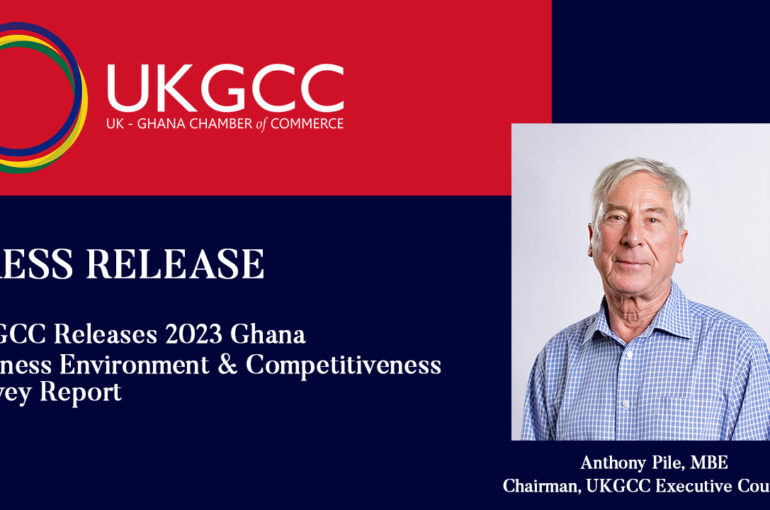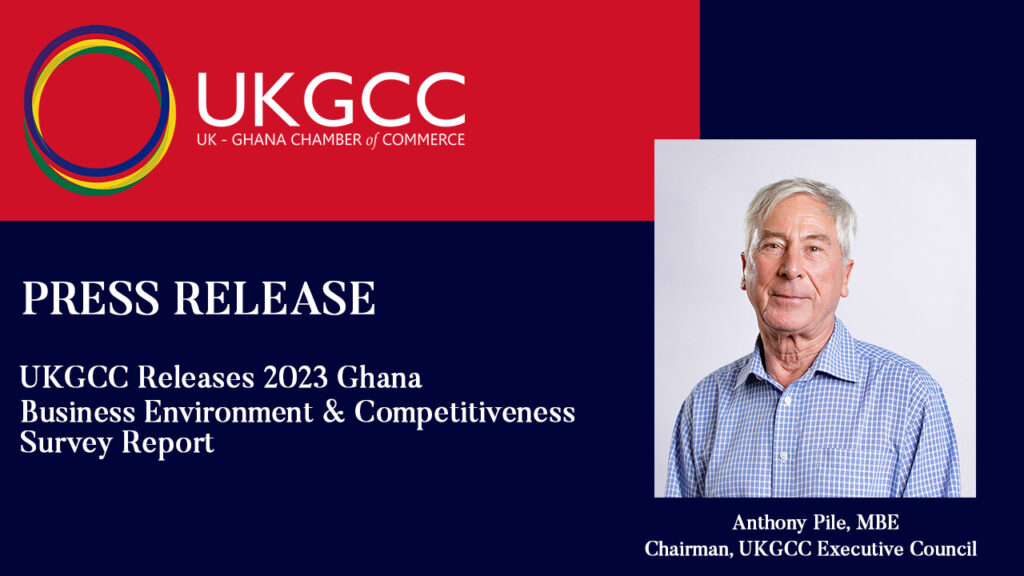UK- Ghana Chamber of Commerce releases “2023 Ghana Business Environment and Competitiveness Survey Report”
UK- Ghana Chamber of Commerce releases “2023 Ghana Business Environment and Competitiveness Survey Report”


The UK- Ghana Chamber of Commerce (UKGCC), a member-based trade association that promotes trade between the UK and Ghana, has released the 5th edition of its annual Ghana Business Environment and Competitive Survey Report for the year 2023.
Over 690 businesses, including UKGCC member and non-member companies from 16 industries ranging from small to large companies, participated in the survey. Business components assessed included cost of and access to capital; availability and cost of labour, water, and power supply; infrastructure; political stability, and corruption among others.
According to the survey results, Ghana’s business environment seems to have slumped in 2023, although Ghana is ranked second on the BMI Trade and Investment Risk Index for West Africa. Moreover, the perception that Ghana’s business environment lags behind other countries deepened in the 2023 survey—72% compared to 47% in 2022 and 40% in 2021. This is in addition to a general view that other countries in the sub-region are not struggling as much as Ghana in the aftermath of COVID-19, the Russian-Ukraine war, and the supply chain disruptions it spawned.
Regarding favourable business components assessed, respondents favourably highlighted the availability of telecom facilities as one of the advantageous aspects of the Ghanaian business environment. It was the perception that telecom facilities and advanced technology have persistently seen the greatest improvements. It was also perceived that cost of labour—unskilled and skilled—remains affordable to most businesses that participated in the 2023 survey.
These notwithstanding, a staggering 75% of respondents perceived corruption as a continuing bane to business operations, even though trends showed a decline in corruption compared to 2022.
Additionally, Government’s support of international trade and the availability of good quality transport infrastructure—two business components critical to the countries’ economic partnership and international trade and investment goals—ranked second and third, respectively, on the worst business components list.
The survey also assessed the most deteriorated business components over the years, as well as the most expensive business costs. According to survey results, a third of respondents flagged cost of capital as the most deteriorated business component over the last five years, with cost of land being the most expensive business cost.
Over a third of respondents reported though that they are not exploiting the opportunity platform inherent in the African Continental Free Trade Area (AfCFTA) despite having the requisite capacity.
Respondents suggested reforms such as Government’s lowering of perceptions of corruption and improving transparency, as well as assuring the safety and security of investments, tax cuts, accessible infrastructure, and government incentives would promote ease of doing business in Ghana.
Anthony Pile MBE, UKGCC Executive Council Chairman, remarked that “this report presents a clear roadmap for action. Lowering corruption, prioritising infrastructure upgrades, addressing regulatory burdens, and investing in skills development are not just numbers on a page – they are the keys to unlocking a brighter future for Ghanaian businesses”.
He urged “the government to embrace these reforms and work hand-in-hand with the private sector to build a competitive and prosperous nation.”
Commenting on the report, Vish Ashiagbor, Country Senior Partner of PwC, a UKGCC Platinum member company and consultants/advisors for the report, noted that “Ghana is in a difficult place. Over the past three years, our economy has been buffeted by events, some of which are external and beyond the control of Government and businesses alike—COVID-19, global financial crisis, and the Russian-Ukraine war which spawned global supply chain hiccups that amplified the economic and business difficulties already triggered by the global financial crisis.
There is no doubt that Government is aware of the role that business plays in its quest to bring about socio-economic development. Indeed, the introduction of the Mutual Prosperity Dialogue is testament to this awareness and acknowledgement. We hope that, in the spirit of transparency, this report is considered objectively by Government, and working with UKGCC, considers what interventions can be implemented in the medium-to-long term to help improve the business environment.”
About the Survey
The UKGCC’s annual Business Climate and Competitiveness Survey was first launched in 2019 and has been conducted every year since then. The main purpose of the survey is to increase the understanding of opportunities and challenges that the Ghanaian market presents for UKGCC members and businesses generally, whether large or small, new or old, and across all sectors.
The survey provides a platform for businesses to provide key feedback on the health, confidence, intentions, and issues of businesses in Ghana and therefore, serves as the foundation for the UKGCC’s advocacy work.
The 2023 edition provides a comprehensive analysis of several important indications of the current business climate, as perceived by businesses, offering a data-driven look at the trends shaping the business landscape.
-END-



